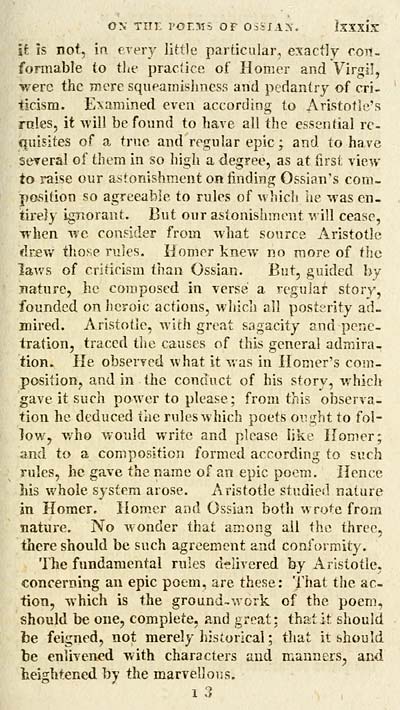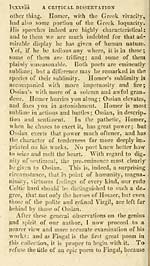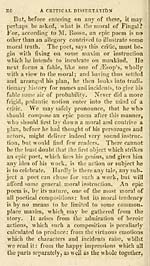Ossian Collection > Poems of Ossian > Volume 1
(107)
Download files
Complete book:
Individual page:
Thumbnail gallery: Grid view | List view

OS Tin: I'or.Mi of 0iiJA.\. Ixxxix
It is not, in every little particular, exactly con-
fonnable to the practice of Homer and Virgil,
v/erc the mere squeainislmess and pedantry of cri-
ticism. Examined even according to Aristotle's
roles, it will be found to have all the essential re-
qiiisites of a true and regular epic; and to have
sereral of them in so high a degree, as at first view
to raise our astonishment on finding Ossian's com-
position so agreeable to rules of Avhicli lie was en-
tirely ignorant. But our astonishment y-ill cease,
TV'hen vTC consider from what source Aristotle
flr£v»^ those rules. Homer knew no more of the
laws of criticism than Ossian. But, guided by
nature, he composed in verse a regular story,
founded on heiroic actions, which all posterity ad-
mired. Aristotle, with great sagacity and penc.
tration, traced the causes of this general admira-
tion. He observed what it was in Homer's com-
positiottj, and in the conduct of his storv, which
gave it such power to please; from this observa-
tion he deduced tne rules which poets ought to fol-
low, w^ho would write and please like Homer;
and to a composition formed according to such
rules, he gave the name of an epic poem. Hence
his whole system arose. Aristotle studied nature
in Homer. Hom.er and Ossian both wro^e from
nature. No wonder that among all the three,
there should be such agreement and conformity.
The fundamental rules delivered by Aristotle,
concerning an epic poem, are these: That the ac-
tion, which is the ground^work of the poem,
should be one, complete, and great: that it should
be feigned, not merely liistorical ; that it should
be enlivened with characters and manners, and
beightened by the marvellous.
1 3
It is not, in every little particular, exactly con-
fonnable to the practice of Homer and Virgil,
v/erc the mere squeainislmess and pedantry of cri-
ticism. Examined even according to Aristotle's
roles, it will be found to have all the essential re-
qiiisites of a true and regular epic; and to have
sereral of them in so high a degree, as at first view
to raise our astonishment on finding Ossian's com-
position so agreeable to rules of Avhicli lie was en-
tirely ignorant. But our astonishment y-ill cease,
TV'hen vTC consider from what source Aristotle
flr£v»^ those rules. Homer knew no more of the
laws of criticism than Ossian. But, guided by
nature, he composed in verse a regular story,
founded on heiroic actions, which all posterity ad-
mired. Aristotle, with great sagacity and penc.
tration, traced the causes of this general admira-
tion. He observed what it was in Homer's com-
positiottj, and in the conduct of his storv, which
gave it such power to please; from this observa-
tion he deduced tne rules which poets ought to fol-
low, w^ho would write and please like Homer;
and to a composition formed according to such
rules, he gave the name of an epic poem. Hence
his whole system arose. Aristotle studied nature
in Homer. Hom.er and Ossian both wro^e from
nature. No wonder that among all the three,
there should be such agreement and conformity.
The fundamental rules delivered by Aristotle,
concerning an epic poem, are these: That the ac-
tion, which is the ground^work of the poem,
should be one, complete, and great: that it should
be feigned, not merely liistorical ; that it should
be enlivened with characters and manners, and
beightened by the marvellous.
1 3
Set display mode to: Large image | Transcription
Images and transcriptions on this page, including medium image downloads, may be used under the Creative Commons Attribution 4.0 International Licence unless otherwise stated. ![]()
| Early Gaelic Book Collections > Ossian Collection > Poems of Ossian > Volume 1 > (107) |
|---|
| Permanent URL | https://digital.nls.uk/77947493 |
|---|
| Shelfmark | Oss.79 |
|---|---|
| Additional NLS resources: | |
| Attribution and copyright: |
|
| Description | " ... to which are prefixed, 'Dissertations on the aera and poems of Ossian translated by James Macpherson'". |
|---|---|
| Shelfmark | Oss.79-80 |
| Additional NLS resources: | |
| Description | Selected books from the Ossian Collection of 327 volumes, originally assembled by J. Norman Methven of Perth. Different editions and translations of James MacPherson's epic poem 'Ossian', some with a map of the 'Kingdom of Connor'. Also secondary material relating to Ossianic poetry and the Ossian controversy. |
|---|
| Description | Selected items from five 'Special and Named Printed Collections'. Includes books in Gaelic and other Celtic languages, works about the Gaels, their languages, literature, culture and history. |
|---|

